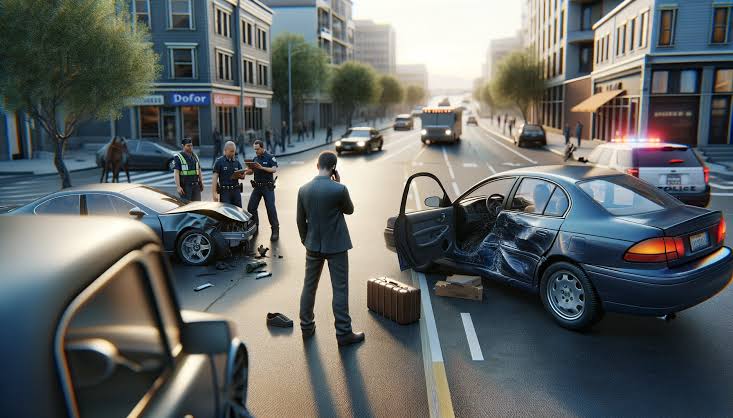Key Takeaways
- Discover crucial steps after a car accident to ensure your safety and legal protection.
- Recognize the significance of collecting precise data and proof at the location.
- Recognize the role of medical assessments in post-accident procedures.
Table of Contents
- Immediate Actions at the Accident Scene
- Prioritizing Safety and Medical Attention
- Documenting the Accident
- Importance of Witness Statements
- Navigating the Insurance Claims Process
- Understanding Legal Rights
- Seeking Professional Legal Assistance
- Long-term Considerations for Recovery
Immediate Actions at the Accident Scene
Acknowledge the importance of gathering accurate data and evidence at the site. Initially, ensure that all individuals are safe from danger, and then contact emergency services. Quick action in alerting authorities is essential, especially if there are injuries. Knowing these steps could be crucial whether you’re a bystander or directly involved in an accident in Lincoln. It’s vital to move the vehicles to safety, such as the side of the road, to prevent further accidents. If unable to move your vehicle, you should ensure that your hazard lights are on, signaling other drivers that your vehicle is stationary. If you need expert guidance, consulting a lawyer for a car accident in Lincoln may be beneficial. These legal professionals have experience handling similar cases and can provide insights specific to your situation.
Once safety is established, it’s essential to think ahead. Understanding and following the correct post-accident procedures can prevent further complications. Furthermore, engaging with law enforcement helps document the incident officially, which benefits insurance and legal proceedings later.
Prioritizing Safety and Medical Attention
Your health and the well-being of others should always come first. Assess yourself for injuries and ensure others are safe, too. Prompt medical checks, even for minor injuries, could be critical. Sometimes, injuries aren’t immediately apparent, and a medical professional can help ensure all is well. Common post-accident symptoms such as whiplash or internal injuries might not be felt instantly but can develop into serious issues over time.
Seeking medical attention promptly also aids in creating a medical record, which is beneficial if legal activities like insurance claims or lawsuits become necessary. Medical documentation is tangible evidence of injuries sustained and their severity following the accident. This step is vital for health reasons and can significantly impact any legal recourse you might pursue.
Documenting the Accident
Accurate documentation is key in protecting yourself legally and financially. Capture photographs of the accident site, the vehicles implicated, and any relevant elements such as skid marks or wreckage. Documenting these details clarifies what transpired, especially when filing claims or dealing with legal matters later. Photographic evidence supports your account and can describe the events that led to the collision. Additionally, note the time, date, weather conditions, and any road signs or traffic lights in the area. This kind of detailed documentation can further illuminate the context of the accident. Other helpful documentation could include the contact and insurance details of the other drivers involved and any statements or acknowledgments of fault they might have provided.
Importance of Witness Statements
Witnesses can provide an unbiased recount of the accident. Collect their contact information and get their statements, which could serve as crucial evidence. Witness accounts can substantiate your version of the events during insurance claims or legal proceedings. Witness statements often tip the scales when liability is disputed, providing a third-party perspective on the incident. Approach witnesses politely and ensure their accounts are documented objectively without leading information. Even a written note or voice recording of a witness statement can prove invaluable when recalling the scene later. Witnesses often notice details that those directly involved in the accident might overlook, adding depth and context to the scene.
Navigating the Insurance Claims Process
Once you’ve documented the accident, contact your insurance company. Providing all gathered information, including police reports and photos, allows for a smoother claim process. Transparency with your provider helps ensure your claim is processed accurately and promptly. Be prepared to describe the accident in detail and submit all required documentation for your claim. After notifying your insurer, following up on the claim’s progress is important. Being proactive can minimize the waiting period for settlement and help manage expectations. Keeping track of all communication with your insurer and documenting your interactions may also be beneficial if disputes arise.
Understanding Legal Rights
Grasping your legal rights is essential following a car crash. It enables you to make well-informed choices concerning claims, settlements, and any required legal measures. Rights may include compensation for repairs, medical expenses, or lost wages due to the accident. Without precise knowledge, you might find yourself overwhelmed by the process. Laws surrounding car accidents can vary significantly by location, so understanding the specific regulations applicable to your area is essential. Understanding your rights can also steer discussions with insurance firms or other individuals associated with the accident and assist in making sure your claims are treated with importance.
Seeking Professional Legal Assistance
If complexities arise, consulting a legal professional can be invaluable. They can guide you through the intricacies of personal injury law and protect your rights. Engaging a knowledgeable attorney could improve your outcomes significantly. They can also provide insight into what settlements might be fair based on the specifics of your case. Legal representatives are skilled in navigating the often complicated landscape of accident claims and can help manage communications with insurance companies, other involved parties, or even courts. For peace of mind and to ensure that your claim is in capable hands, reaching out to a qualified legal professional is often a wise decision.
Long-term Considerations for Recovery
The aftermath of a car accident isn’t just about solving immediate issues; long-term recovery is equally important. Physical therapy and mental health support can play vital roles in ensuring a holistic recovery. Ongoing medical assessments to evaluate and treat delayed injury symptoms can mitigate long-term health impacts. It’s also essential to seek support for mental and emotional health, as accidents can be traumatic and leave lasting psychological effects. Engaging with community support groups or mental health professionals can be beneficial for a full recovery.

